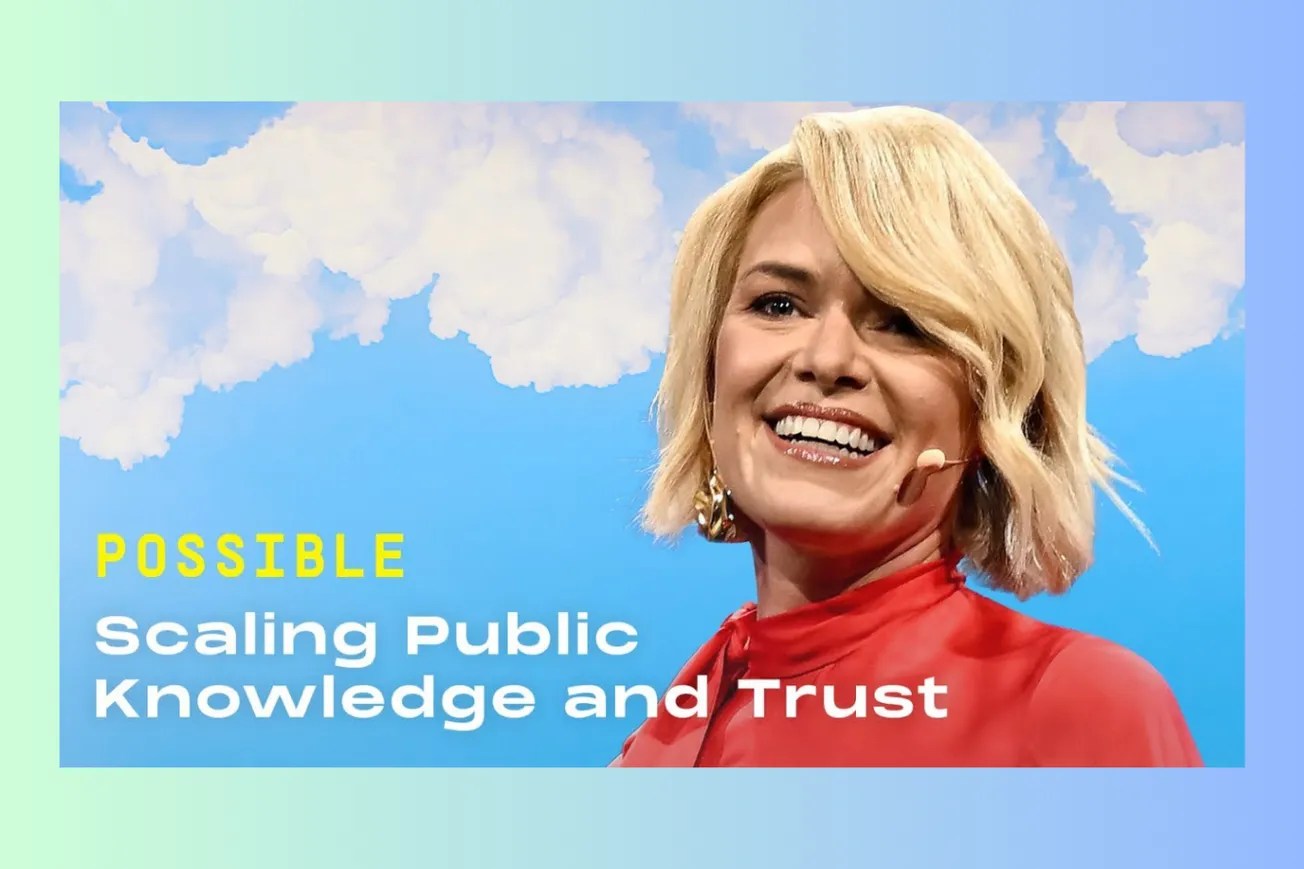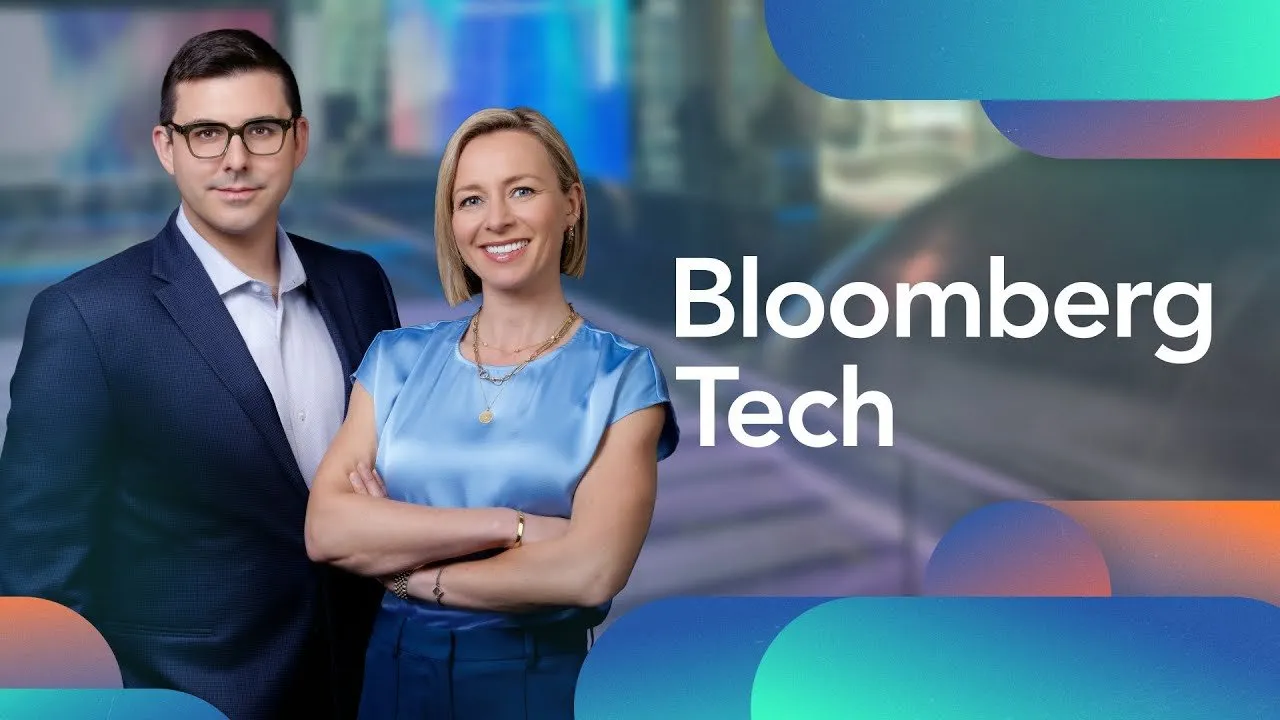Table of Contents
Katherine Maher's journey from Wikipedia's CEO to AI governance advisor offers unique insights into building trustworthy information systems at global scale.
Key Takeaways
- Global South countries show significantly more optimism about AI opportunities than Western nations, particularly around closing infrastructure and economic gaps
- Comprehensive data privacy regulation in the US would strengthen America's position in international AI governance discussions
- Wikipedia's transparent bias acknowledgment and correction mechanisms offer valuable lessons for AI training data accountability
- Citizens assemblies provide a proven model for constructive democratic discourse that could inform AI governance approaches
- The internet hasn't destroyed trust in institutions but rather exposed existing systemic failures and made them visible at scale
- AI citation systems are technically feasible but should be prioritized for critical applications like medical research over general queries
- Future AI tools could democratize coding skills globally, giving more people agency to build solutions for their communities
- Democratic institutions must articulate clearer value propositions to compete with more responsive private sector services
- Wikipedia's API model for AI training data creates win-win scenarios without compromising open access principles
- Local community norms around discourse and privacy resist simple scaling to global internet platforms
The Political Foundation: Family Influence and Public Service
Maher's perspective on governance stems partly from watching her mother's political journey. CC Maher went back to school at 13 when Katherine was a teenager, earned a master's degree, ran social service agencies, retired, then decided she wasn't done contributing and successfully ran for the Connecticut state senate. She now serves on the energy and technology committee.
This family example shaped Maher's belief that "reinvention is continuous and possible at all ages and at all times." Her mother once told her that her highest ambition when marrying Katherine's father was simply being able to take the kids to the beach all summer. The transformation from that domestic dream to state senate leadership exemplifies the expanded opportunities that opened up for women of her generation.
- Maher provides her mother with "a lot of unsolicited advice" on privacy regulation and tech sector competitiveness
- The family joke is that Katherine is actually following in her mother's footsteps rather than leading the way
- This dynamic illustrates how policy expertise can bridge generational and institutional boundaries
- Their conversations cover economic competitiveness through technology policy but avoid anything "approaching lobbying"
The personal foundation matters because it demonstrates how democratic participation can evolve across generations, with expertise flowing both directions between family members engaged in different aspects of governance.
AI Governance on the Global Stage: The Blinken Meetings
As a member of the Secretary of State's Advisory Board, Maher meets regularly with Anthony Blinken's team to discuss technology's geopolitical implications. Their recent sessions focused heavily on AI governance, where Maher brought a distinctly competitive perspective.
The core challenge she outlined is regulatory primacy competition between China and the United States. This isn't just about AI models themselves, but about who gets to define the fundamental governance frameworks for internet infrastructure. China has become "a very active player" in standards bodies that most people have never heard of but that define critical internet engineering protocols.
- China contests the multi-stakeholder governance model that has underpinned internet development for three decades
- Chinese policies around technology transfer for infrastructure projects create alternative governance pathways
- Western nations have been "perhaps not as vigorously attentive as I would have hoped" to these standards competitions
- The stakes involve fundamental questions about privacy, openness, interconnectivity, and data flows
Maher argues this competition isn't merely technical—it reflects competing governance philosophies. The Western model has been "open," "democratic," sometimes "slow" and "frustrating," but effective at bringing together private sector, civil society, and democratically elected leaders. If Western nations don't actively invest in this model, "we're also receding ground away from this idea that democratic participation is in fact the best way to govern."
Her primary policy recommendation is comprehensive data privacy regulation in the United States. This would clarify domestic technology policies and enable more coherent positions in trade negotiations and foreign policy discussions around tech issues. Having clear regulatory frameworks would allow America to "enter into these spaces with greater clarity about how and how we do not regulate technology."
Reframing the AI Debate: Global Optimism vs Western Pessimism
One of Maher's most striking observations challenges the dominant narrative about AI sentiment. While Western discourse focuses heavily on risks and downsides, polling data shows "the vast majority of the world is actually quite optimistic about the role of AI." This is particularly true in Global South countries and emerging markets.
People in these regions see AI as potentially closing "historic infrastructure gaps" and expanding access to "economic opportunity, healthcare and the like." Meanwhile, "in the west and particularly in the United States we actually have on average the lowest positive sentiment about the introduction of AI."
- Global majority countries view AI as a tool for closing development gaps
- Western nations remain focused on defensive risk management rather than opportunity creation
- This sentiment gap has significant geopolitical implications for AI governance discussions
- America risks being seen as obstructionist rather than collaborative in global AI development
Maher warns that if the US remains in "an incredibly defensive posture," it risks missing opportunities to be part of global AI transformation and to be seen as an ally in that process. In an "increasingly multipolar world," American legitimacy depends partly on demonstrating that democratic governance models can deliver on basic human development indicators like jobs, education, healthcare, and family security.
The key insight is that pure risk focus, while important, can become strategically counterproductive if it prevents engagement with legitimate global aspirations for AI-enabled development. Effective governance requires balancing legitimate concerns with constructive participation in global opportunities.
Truth, Neutrality, and the Wikipedia Model
Maher's seven years leading Wikipedia, including five as CEO, provide unique insights into managing contested information at global scale. Her fundamental framework distinguishes between "what is truth and what is known" and between "what is truth and what is observable fact."
Wikipedia's approach starts with "citable, observable fact and then built out truth." The advantage of Wikipedia's system is that truth remains "continuously contested," and the more representative and globally diverse the contributors become, "the more truth will be in the room in addition to fact."
- Wikipedia deliberately acknowledges its "horrible" bias rather than claiming neutrality
- The bias stems from "historical factors," participation patterns, and what information has been "deemed to be noteworthy knowledge"
- All bias is "open and at least observable and also alterable" through transparent editing processes
- Multiple truths can coexist based on different perspectives and cultural contexts
This creates space for understanding that truth isn't monolithic—there are multiple valid perspectives that can be held simultaneously without requiring false consensus. The goal isn't eliminating all perspective but making the perspectives visible and allowing for ongoing refinement.
Maher argues that neutrality as an absolute standard may not even be desirable for those seeking to "transform our systems to better humanity." Sometimes disruption and change are necessary, but having places like Wikipedia that can serve as reference points for shared factual understanding remains valuable.
The Wikipedia model suggests that managing contested information requires transparency about limitations, active engagement with bias, and systems that allow for continuous improvement rather than fixed final answers.
AI Training Data: Lessons from Wikipedia's Transparency
Wikipedia serves as training data for virtually every major AI system, which creates both opportunities and concerns. Maher emphasizes that Wikipedia's inclusion in training datasets isn't new—it's been used for translation tools and other language processing applications for years as "the largest natural language dataset" for many languages in digitized format.
The challenge is that Wikipedia's acknowledged biases get baked into AI systems without the same transparency and correction mechanisms. While Wikipedia bias is "open and at least observable and also alterable," AI training systems often lack transparency about "what percentage or what weights are afforded to this information."
- Many AI systems aren't "continuously updated in ways that allow for edits or alterations in more of a public and transparent fashion"
- The "closed loop system of being able to identify and then correct is not available to the public" like it is with Wikipedia
- This removes the community correction mechanisms that make Wikipedia's bias manageable over time
- Different AI companies may weight or process Wikipedia content differently without public visibility
Maher advocates for greater transparency in training data attribution and ongoing correction mechanisms. The lessons from Wikipedia suggest that acknowledging bias isn't sufficient—there must be systematic ways to identify and correct it over time with community input.
For Wikipedia itself, she's less concerned about AI competition because Wikipedia contributors aren't primarily motivated by efficiency. They "take joy in the act of information construction" and "the act of negotiation of facts and representation of information." AI tools may help with this process, but the human-driven collaborative aspect will remain central to Wikipedia's value and appeal.
Citation and Accountability in AI Systems
Drawing from Wikipedia's citation practices, Maher argues that AI citation systems are both technically feasible and selectively necessary. Wikipedia's experience shows that "very few people engage with the citations, but the fact that they are there allows people to do so" and enables confidence assessment about information sources.
Most people check citations once to establish trust in a platform, then transfer that confidence to future interactions. Only a "tiny percentage of people" need to actively validate citations for the system to work effectively. Citations also create valuable information networks, similar to academic citation analysis, that reveal source patterns and research gaps.
- Medical AI applications should prioritize high-fidelity citation—Maher mentions a medical research AI with "an average of 36 citations per synthesis"
- Citations provide "temporality," "accuracy," "scope of research applicability," and "diversity of subjects" in research contexts
- For general queries like Vancouver hiking recommendations, extensive citation may be less critical
- The key is matching citation requirements to the stakes involved in different applications
Maher serves on the board of a medical AI company that built its model from publicly available scientific research with extensive citation. This demonstrates that comprehensive citation is "quite possible to do if you prioritize it" and design systems with source attribution in mind from the beginning.
The Wikipedia model suggests that citation systems work through social proof and spot-checking by engaged community members rather than universal verification by all users.
Trust, Institutions, and Internet-Scale Governance
Maher offers a nuanced analysis of how the internet affects institutional trust. Rather than destroying trust outright, the internet has "surfaced fissures within systems and allowed them to grow and grow publicly at an exponential rate."
Many institutions were designed for relatively homogeneous populations and weren't particularly responsive even to those groups. As populations became more diverse through "immigration, diversification, civil rights movement," these institutions proved "not actually fit for purpose" for broader constituencies.
- The internet created expectations of "hyper responsive" services that make traditional institutional inefficiencies more apparent
- People can now "reckon in real time" with institutional failures, making gaps more evident to more people
- This creates new expectations about how institutions "should function in our lives" around responsiveness and accountability
- The primary trust issue isn't algorithm-delivered misinformation but institutional performance gaps
Maher argues this institutional performance crisis represents both challenge and opportunity for those who believe institutions remain essential for "stable democratic rights respecting representative governance." The solution isn't defending existing institutional forms but making them genuinely responsive and accountable.
This analysis suggests that technology platform governance challenges mirror broader democratic governance challenges—both struggle to maintain legitimacy while serving diverse populations at unprecedented scale.
Citizens Assemblies and Constructive Discourse
As an alternative to traditional democratic processes, Maher highlights citizens assemblies as proven models for constructive engagement on divisive issues. Citizens assemblies use randomly selected ordinary citizens to deliberate on specific policy questions, giving "everyday people a voice in the decision-making process."
Despite diversity in assembly composition, participants often "find common ground on highly divisive and contested issues and produce outcomes with fairly significant nuance." This model works particularly well for values questions rather than specific policy implementation details.
- Citizens assemblies address both long-term institutional defunding and short-term anti-institutional messaging
- They create "spaces of discourse that are highly constructive and start with sort of a common set of facts"
- Success depends on expanding these constructive dialogue circles "perpetually outward" into broader public discourse
- Historical precedents include New England town assemblies and various community meeting formats
Maher notes that technology has "pulled us away from some of these tried and true tested tools of engagement" that consistently produce better outcomes. While technology might help mediate such processes, the fundamental value lies in face-to-face engagement where people extend good faith to others in the room.
The challenge remains scaling these intimate deliberative processes to address policy questions affecting millions of people without losing the constructive dynamics that make small-group deliberation effective.
Managing Dissent and Online Discourse
Maher's framework for online discourse governance emphasizes context-specific community standards rather than universal rules. She notes that normative expectations around expression, privacy, and harassment vary dramatically across cultures, citing privacy norms in Germany versus the Netherlands as examples.
Both countries have strong privacy protections, but Germans typically close curtains to maintain domestic privacy and avoid imposing on neighbors, while Dutch people keep curtains open because closing them suggests "something to hide." These different expressions of similar values highlight the challenge of creating universal internet governance standards.
- Local democratic norms developed around specific geographic communities and their "town green" or "town square" interactions
- Scaling these norms to "a five billion person network" requires new approaches since "we have no idea how to do that"
- Clear community codes of conduct work better than attempting universal standards across all online spaces
- Different online communities need policies "appropriate to those communities and to the purpose we're trying to seek"
Maher advocates for "clear codes of conduct and policies for spaces online" that can be enforced consistently within specific communities. This allows for "objection, dissent, friction in the process" while maintaining boundaries against harassment and incitement.
The key insight is that effective online governance happens through replicable but community-specific approaches rather than top-down universal standards that ignore cultural and contextual differences.
Data Usage Models: Beyond Paywalls
Wikipedia's approach to AI training data offers an alternative to simple paywall models. Rather than restricting access to freely licensed content, Wikipedia developed APIs that companies could access "for a nominal fee" to get consistent, transparent, and accountable access to Wikipedia data.
This created value for both Wikipedia and AI companies. Companies could have taken the free content anyway, but the API model provided "consistency, transparency, accountability" around data access and maintenance that had genuine value for their computational needs.
- Wikipedia wasn't "selling private data" or "selling freely licensed content" but rather "selling a model of support"
- This created "additional income" for Wikipedia to continue supporting its sites while maintaining open access principles
- The approach represents a "win-win type" model that supports both innovation and content creation sustainability
- It offers an alternative to "throw up a paywall" approaches that may not represent optimal long-term solutions
Maher distinguishes between different types of data in AI training contexts. Private data like health information or communications should absolutely require explicit consent. For published content like news, art, blogs, and Wikipedia articles, she sees potential for business models that create value for both content creators and AI developers.
The Wikipedia example suggests that sustainable data usage models can preserve open access principles while creating fair value exchange between content creators and AI companies.
Future Possibilities: Democratizing Technical Skills
Looking ahead fifteen years, Maher sees AI potentially fulfilling the original promise of the computer revolution by democratizing technical skills. For the past decade, the conventional wisdom emphasized that children needed to learn coding to "have control over the future."
AI tools are now making development environments accessible to people without formal programming training. This could create "a generation that is so much more computer literate and has the capacity to build the solution sets to their problems" using skills that were previously inaccessible due to lack of teachers or resources.
- AI provides "the teacher" that wasn't available in many classrooms or remote learning contexts
- Every device now has sufficient "compute power" for learning these skills globally
- This democratization could give "real power to everyone to have real agency over the things that are important to their communities"
- It represents the fulfillment of promises made about computer and internet access expanding human capability
This vision connects back to Maher's emphasis on global AI optimism and development opportunities. Rather than viewing AI primarily through risk management lenses, this framing sees AI as potentially delivering on long-standing promises about technology expanding human agency and problem-solving capacity.
The optimistic scenario involves people around the world gaining technical skills to address local challenges independently, rather than waiting for external solutions or expertise to arrive.
The path forward requires balancing legitimate concerns about AI risks with constructive engagement in the genuine opportunities AI presents for expanding human capability and addressing persistent development challenges. This means building governance systems that can manage risks while enabling innovation, particularly in contexts where AI tools could address basic human development needs that traditional approaches have struggled to meet.





